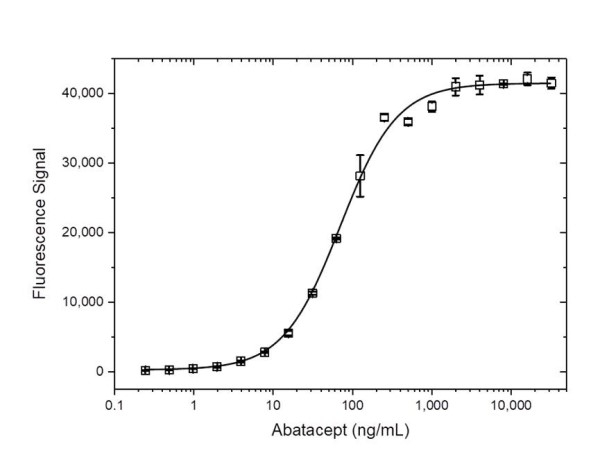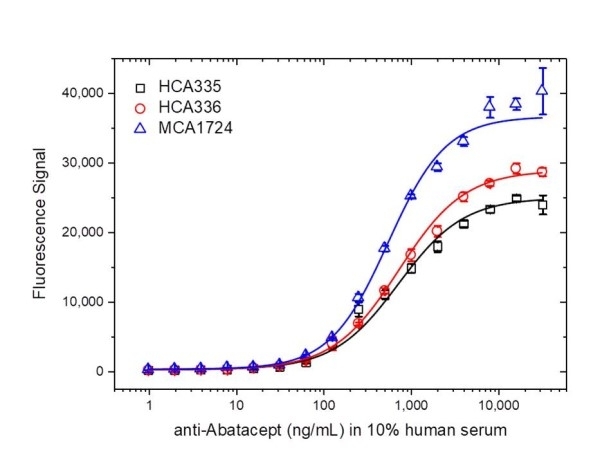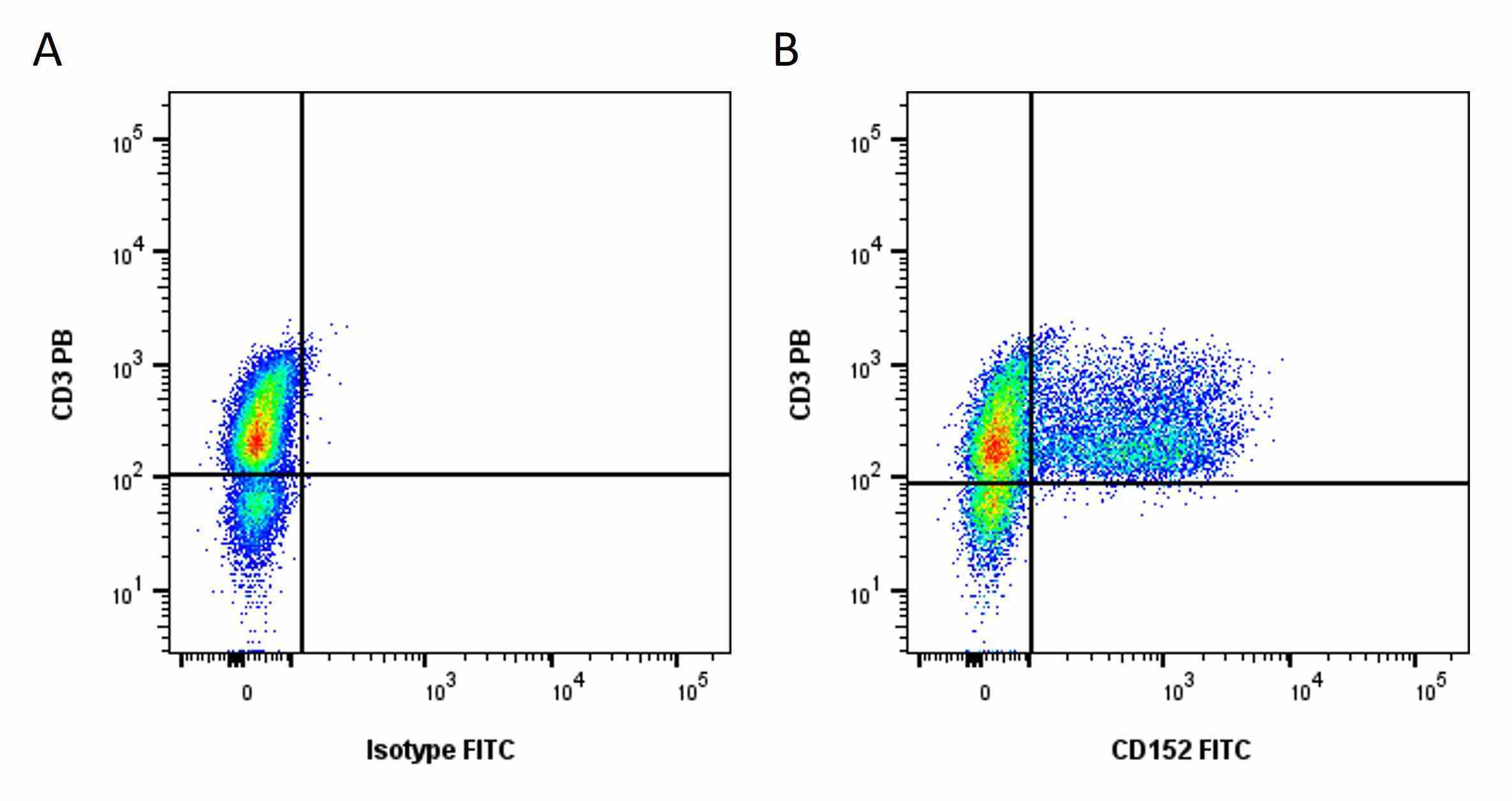CD152 antibody | BNI3



Mouse anti Human CD152:Alexa Fluor®647
- Product Type
- Monoclonal Antibody
- Clone
- BNI3
- Isotype
- IgG2a
- Specificity
- CD152
| Mouse anti Human CD152 antibody, clone BNI3 recognizes human CD152, also known as CTLA-4 (cytotoxic T-lymphocyte-associated antigen 4), an inhibitory receptor and negative regulator of T-cell responses. CD152 is a single pass type 1 transmembrane protein belonging to the immunoglobulin superfamily containing a single Ig-v-like domain in the extracellular region. CD152 along with CD28 binds to the co-stimulatory molecules CD80 and CD86 (Azuma et al. 1993). Mouse anti human CD152 antibody, clone BNI3 is able to block ligand binding on the Raji B-cell line (Steiner et al. 2001) and blocks binding of an alternative clone, BNI8 to CTLA-4/Ig in ELISA. Mouse anti Human CD152 antibody, clone BNI3 binds to the same epitope as classified anti CTLA-4 clones 11D4 and 10A8 (Wang et al. In: Leukocyte typing VI 1997 Garland Publishing Inc. pp97-98, Bull World Health Organ. 1997). The cytoplasmic domain of CD152 contains a critical tyrosine at residue 201 phosphorylated by Janus Kinase 2 which subsequently controls surface expression through regulation of CD152 interaction with AP-2 (Shiratori et al. 1997, Chikuma et al. 2000). CD152 is expressed primarily as an intracellular antigen with transport to the cell surface under tight regulation of several molecules including Trim, PLD and TIRC7, CD152 also demonstrates rapid internalization once expressed at the cell surface (Valk et al. 2008). CD152 plays a significant role in maintaining tolerance to self antigens and defects in CD152 presentation and expression has been implicated in a number of autoimmune diseases (Romo-Tena et al. 2013). This antibody can be used to develop a pharmacokinetic (PK) bridging assay to measure free fusion protein drug abatacept. It is recommended as the capture reagent, paired with human anti abatacept antibody HCA335 as the detection antibody. Abatacept (Orencia) is a recombinant fusion protein consisting of the extra-cellular domain of human CTLA-4, fused to the modified Fc (hinge, CH2, and CH3 domains) portion of human IgG1. |
- Target Species
- Human
- Product Form
- Purified IgG conjugated to Alexa Fluor® 647 - liquid
- Preparation
- Purified by affinity chromatography on Protein A from tissue culture supernatant
- Buffer Solution
- Phosphate buffered saline
- Preservative Stabilisers
- 0.09% Sodium Azide (NaN3)
1% Bovine Serum Albumin - Immunogen
- Human CTLA-4/human IgG heavy chain fusion protein.
- Approx. Protein Concentrations
- IgG concentration 0.05 mg/ml
- Fusion Partners
- Spleen cells from immunised BALB/c mice were fused with cells of the mouse P3/X63-Ag8.653 myeloma cell line.
- Max Ex/Em
-
Fluorophore Excitation Max (nm) Emission Max (nm) Alexa Fluor®647 650 665 - Regulatory
- For research purposes only
- Guarantee
- 12 months from date of despatch
- Acknowledgements
- This product is provided under an intellectual property licence from Life Technologies Corporation. The transfer of this product is contingent on the buyer using the purchased product solely in research, excluding contract research or any fee for service research, and the buyer must not sell or otherwise transfer this product or its components for (a) diagnostic, therapeutic or prophylactic purposes; (b) testing, analysis or screening services, or information in return for compensation on a per-test basis; (c) manufacturing or quality assurance or quality control, or (d) resale, whether or not resold for use in research. For information on purchasing a license to this product for purposes other than as described above, contact Life Technologies Corporation, 5791 Van Allen Way, Carlsbad CA 92008 USA or outlicensing@thermofisher.com
Orencia is a trademark of Bristol-Myers Squibb Company
Avoid repeated freezing and thawing as this may denature the antibody. Storage in frost-free freezers is not recommended.
| Application Name | Verified | Min Dilution | Max Dilution |
|---|---|---|---|
| Flow Cytometry 1 | 1/5 | 1/10 |
- 1 Membrane permeabilization is required for this application. The use of Leucoperm (Product Code BUF09) is recommended for this purpose.
- Flow Cytometry
- Use 10μl of the suggested working dilution to label 1x106 cells in 100μl
| Description | Product Code | Applications | Pack Size | List Price | Your Price | Quantity | |
|---|---|---|---|---|---|---|---|
| Mouse IgG2a Negative Control:Alexa Fluor® 647 | MCA929A647 | F | 100 Tests/1ml |
|
Log in | ||
| List Price | Your Price | ||||||
|
|
Log in | ||||||
| Description | Mouse IgG2a Negative Control:Alexa Fluor® 647 | ||||||
References for CD152 antibody
-
Linsley, P.S. et al. (1992) Coexpression and functional cooperation of CTLA-4 and CD28 on activated T lymphocytes.
J Exp Med. 176 (6): 1595-604. -
Kuiper, H.M. et al. (1995) Activated T cells can induce high levels of CTLA-4 expression on B cells.
J Immunol. 155 (4): 1776-83. -
Castan, J. et al. (1997) Accumulation of CTLA-4 expressing T lymphocytes in the germinal centres of human lymphoid tissues.
Immunology. 90 (2): 265-71. -
Steiner, K. et al. (1999) Enhanced expression of CTLA-4 (CD152) on CD4+ T cells in HIV infection.
Clin Exp Immunol. 115 (3): 451-7. -
Steiner, K. et al. (2001) Increased expression of CTLA-4 (CD152) by T and B lymphocytes in Wegener's granulomatosis.
Clin Exp Immunol. 126: 143-50. -
Pistillo, M.P. et al. (2003) CTLA-4 is not restricted to the lymphoid cell lineage and can function as a target molecule for apoptosis induction of leukemic cells.
Blood. 101: 202-9. -
Tan, P.H. et al. (2005) Creation of tolerogenic human dendritic cells via intracellular CTLA4: a novel strategy with potential in clinical immunosuppression.
Blood. 106: 2936-43. -
Lee, C.C. et al. (2009) The regulatory function of umbilical cord blood CD4(+) CD25(+) T cells stimulated with anti-CD3/anti-CD28 and exogenous interleukin (IL)-2 or IL-15.
Pediatr Allergy Immunol. 20 (7): 624-32.
View The Latest Product References
-
Ward, F.J. et al. (2013) The soluble isoform of CTLA-4 as a regulator of T-cell responses.
Eur J Immunol. 43 (5): 1274-85. -
Lu, C.H. et al. (2016) DNA Methyltransferase Inhibitor Promotes Human CD4+CD25hFOXP3+ Regulatory T Lymphocyte Induction under Suboptimal TCR Stimulation.
Front Immunol. 7: 488.
Further Reading
-
Chin, L.T. et al. (2008) Immune intervention with monoclonal antibodies targeting CD152 (CTLA-4) for autoimmune and malignant diseases.
Chang Gung Med J. 31: 1-15.
- Synonyms
- CTLA-4
- UniProt
- P16410
- Entrez Gene
- CTLA4
- GO Terms
- GO:0005887 integral to plasma membrane
- GO:0005794 Golgi apparatus
- GO:0006955 immune response
- GO:0006974 response to DNA damage stimulus
- GO:0009897 external side of plasma membrane
- GO:0030889 negative regulation of B cell proliferation
- GO:0031295 T cell costimulation
- GO:0043065 positive regulation of apoptosis
- GO:0045334 clathrin-coated endocytic vesicle
- View More GO Terms
- GO:0045590 negative regulation of regulatory T cell differentiation
- GO:0048471 perinuclear region of cytoplasm
- GO:0050853 B cell receptor signaling pathway
MCA1724A647
If you cannot find the batch/lot you are looking for please contact our technical support team for assistance.
Please Note: All Products are "FOR RESEARCH PURPOSES ONLY"
View all Anti-Human ProductsAlways be the first to know.
When we launch new products and resources to help you achieve more in the lab.
Yes, sign me up

